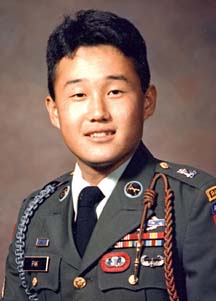
[ OUR OPINION ]
Alien defrauder
deserves deportation
from United StatesALIENS convicted of felony crimes can expect to be deported to their home country, but a South Korean man maintains he should be made an exception because he served in the U.S. Army during the first Gulf War. Pyong Kun Pak should have thought about that before becoming the first person in Hawaii to parlay identity theft into Internet fraud on a large scale to feed his illegal drug habit. His request to remain in the United States should be rejected. Military service is not a license to commit crime.
THE ISSUE
A South Korean man convicted in Hawaii of fraud is objecting to the prospect that he be deported from the United States.
From December 1999 to April 2000, Pak stole Social Security numbers, birth dates and other confidential information from 30 people to buy computers that he is believed to have pawned for as much as $500,000 so he could buy enough crystal methamphetamine to support his addiction. Police put an end to his scam by capturing him after he leaped from the second-story lanai of a Waikiki hotel in an attempt to flee. He was carrying a packet of "ice" and a glass smoking pipe when apprehended.
Pyong Kun Pak: He stole the identities of 30 people
Pak, who also used the names of Henry Tacub and Peter Pak, pleaded no contest in December 2001 to 16 counts of theft, attempted theft and computer fraud. He was sentenced to a maximum prison term of 10 years and agreed to pay $109,410 in restitution. He is eligible for parole in June 2005.
Pak, 34, came to Hawaii with his family at age 6 but never took out U.S. citizenship. A permanent resident alien, he served four years as an Army Ranger, including a stint in the Gulf War, which his family says caused him psychological problems leading to drug abuse.
His attorney, William Harrison, acknowledges that Pak has never been diagnosed with post-traumatic stress syndrome, the ailment that many soldiers blame for their later difficulties. Pak's mother says he repeatedly refused his family's requests that he seek psychiatric help.
Harrison says the Homeland Security Department's Bureau of Immigration and Customs Enforcement, formerly the Immigration and Naturalization Service, wants his client "branded a criminal and kicked out of the country" largely because of the anti-terrorism crackdown. However, the law pertaining to deportation of convicted felons such as Pak did not change after Sept. 11, 2001 -- nor did the application of the law change -- and the number of deported criminal aliens actually decreased in the 2002 fiscal year from the previous year. Pak confirmed he was a criminal by entering into the plea; his booking sheet listed his occupation as "forger."
Thousands of aliens are deported every year because they committed what the deportation law calls aggravated felonies, which include fraud. Those decisions by immigration judges can be appealed to the Justice Department's Board of Immigration Appeals and eventually to the federal courts. Pak's criminal behavior was more serious than the crimes of many aliens who face deportation, and allowing him to remain would be unfair to them.
BACK TO TOP |
Veterans finally get
long-term care facilityVETERANS and others who have worked long and hard for a care home in Hilo can breath a sigh of relief as Governor Lingle authorized release of state funds for its construction last week, just a day before a deadline for the project to receive matching federal money was to expired.
THE ISSUE
Governor Lingle releases state funds to build a long-term care home in Hilo.Although Lingle cut the number of beds in the long-term care home by more than half, veterans will finally get a facility in Hawaii, one of only three states that don't have such a home.
Citing the state's financial problems, the governor reduced the $16 million approved by the state Legislature for the home to $10 million to pay for the state's share of the project. Hawaii Sen. Daniel Inouye had arranged for the federal government to provide $29 million. The original plan was to build a 200-bed unit, but Lingle scaled that back to 95 beds, saying that will be enough to meet the needs of Big Island veterans. She also wants a private company to operate the facility to save having to pay civil service workers.
The project is the realization of years of petitioning and lobbying by elderly veterans, who were supported by Mayor Harry Kim, the County Council, the state Department of Defense, economic development groups, health-care organizations and private businesses.
All should be commended for their efforts. Despite the curtailments, the care home properly recognizes the debt Hawaii and its citizens owe to military veterans.

